The Cosmo Energy Group recognizes the responsibility to ensure that the human rights of every stakeholder are fully respected. This is why our Code of Conduct clearly states our respect for human rights, and why our Human Rights Policy stresses the importance of human rights and our corporate responsibility to respect them. The Cosmo Energy Group will fulfill its Management Vision and contribute to the development of a sustainable world by maintaining respect for human rights across all of its business activities, in accordance with the Human Rights Policy.
Implementation Structure
The Board of Directors supervises the Group’s efforts to decide, promote, implement, and verify execution of basic policies on corporate ethics. This includes the Group’s efforts to promote, implement, and verify execution of efforts to respect human rights and prevent and rectify any human rights violation that my occur either in or outside of Japan. Our Sustainability Strategy Council and Sustainability Committee serve to fulfill these purposes.
We also look at the entire supply chain, investigating human rights compliance across the supply chain within the framework of our sustainable procurement initiatives.
Implementing Human Rights Due Diligence
The Group conducted human rights due diligence in accordance with the United Nations Guiding Principles on Business and Human Rights (UNGPs) on the value chain of petroleum products, its main business, in fiscal 2022, on the value chains of other businesses in fiscal 2023, and on the entire supply chain in fiscal 2024. The goal was to identify and evaluate human rights risks, and to propose improvement measures (such as establishing an educational mechanism). Based on written and interview-based surveys, employee awareness surveys, and external information, we evaluated apparent and latent risks and management structure vulnerabilities, seeking to create a map of potential human rights issues. While no risks with a high seriousness of impact and likelihood of occurring combined with a low ratio of vulnerabilities that have been addressed were identified, we will implement corrective measures for issues requiring attention based on the evaluation results as part of our future initiatives.
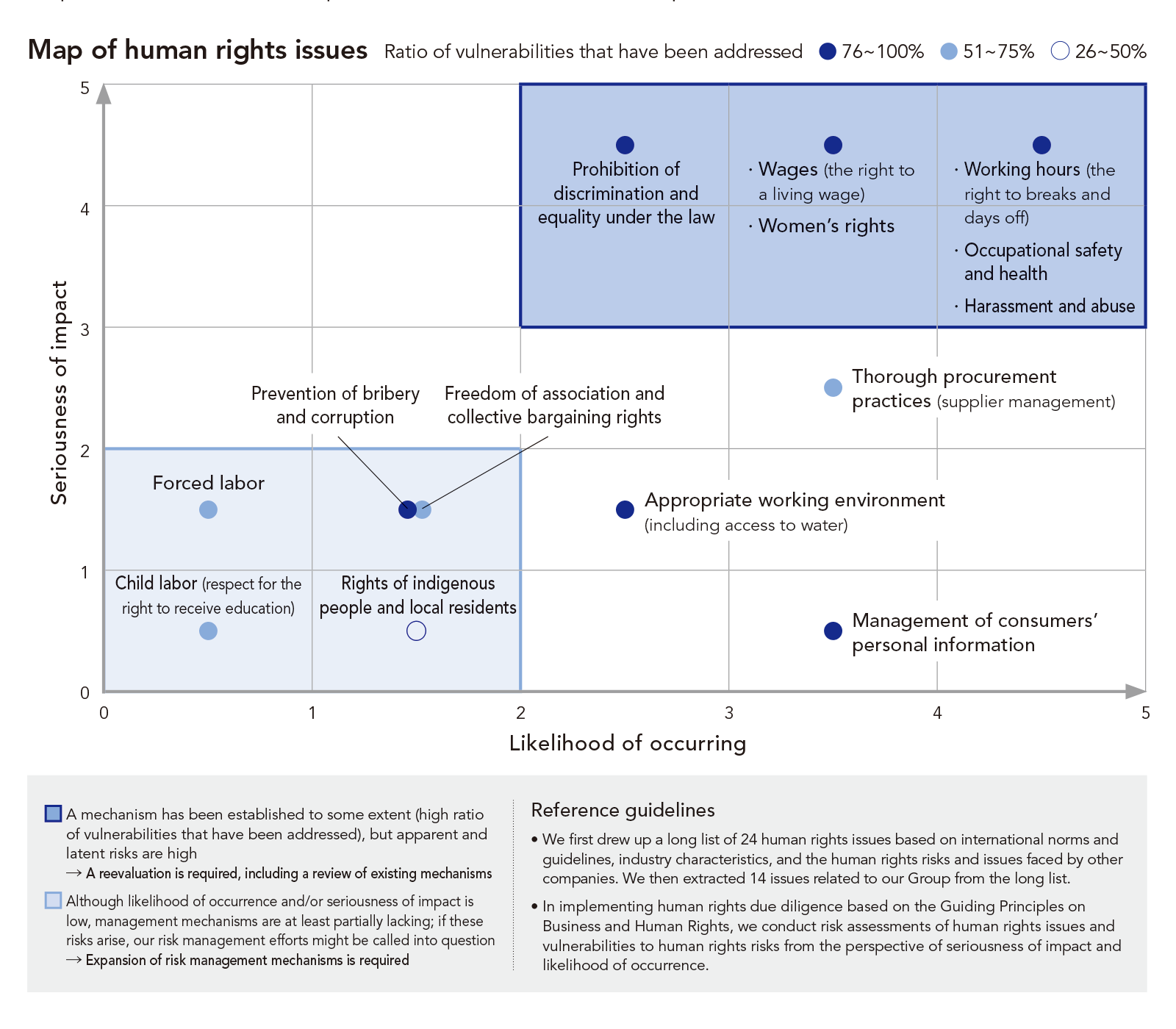
Relief Mechanism
The Group has established the Cosmo Energy Group Corporate Ethics Office to promote and implement activities related to corporate ethics and human rights. In addition, contact points for the Cosmo Energy Group Corporate Ethics Consultation Helpline, which allows employees to anonymously consult on and report misconduct and ethical issues, such as violations of laws and company rules, have been established both within and outside the Group.
Expert Dialogue
We invited Hideki Wakabayashi, Director, THINK Lobby, Japan NGO Center for International Cooperation (JANIC), to talk about our human rights initiatives with our Junko Takeda, Director and Senior Executive Officer, on June 26, 2024.
Takeda: The Cosmo Energy Group manages a long supply chain that extends from oil exploration and production in the Middle East, to petroleum transportation, refining, and sales. A diverse range of human resources are involved in these processes, and it is extremely important for us to ensure the protection of their human rights. To help us further enhance our efforts in this area, I wonder if you could share your expertise with me today.
Wakabayashi: Over the past decade or so, many companies have been working to enhance their human rights initiatives. While none of these efforts has been perfect, it is still important to keep working on them. The Cosmo Energy Group Code of Conduct includes provisions on human rights due diligence, and I believe you have a good framework in terms of rules and policies for due diligence implementation. However, even when policies are in place, it is also crucial to check whether they are actually being implemented. Therefore, I would recommend that your company employs some ingenuity to devise more effective methods of monitoring implementation. As society changes, public awareness of human rights is also evolving, so you would do well to take this into consideration as part of your ongoing human rights due diligence initiatives. While an internal monitoring system is a good foundation, corporate growth ultimately depends on the involvement of individual employees in these efforts. It is important for each employee to make steady progress using an incremental and grounded approach, based on their individual positions.
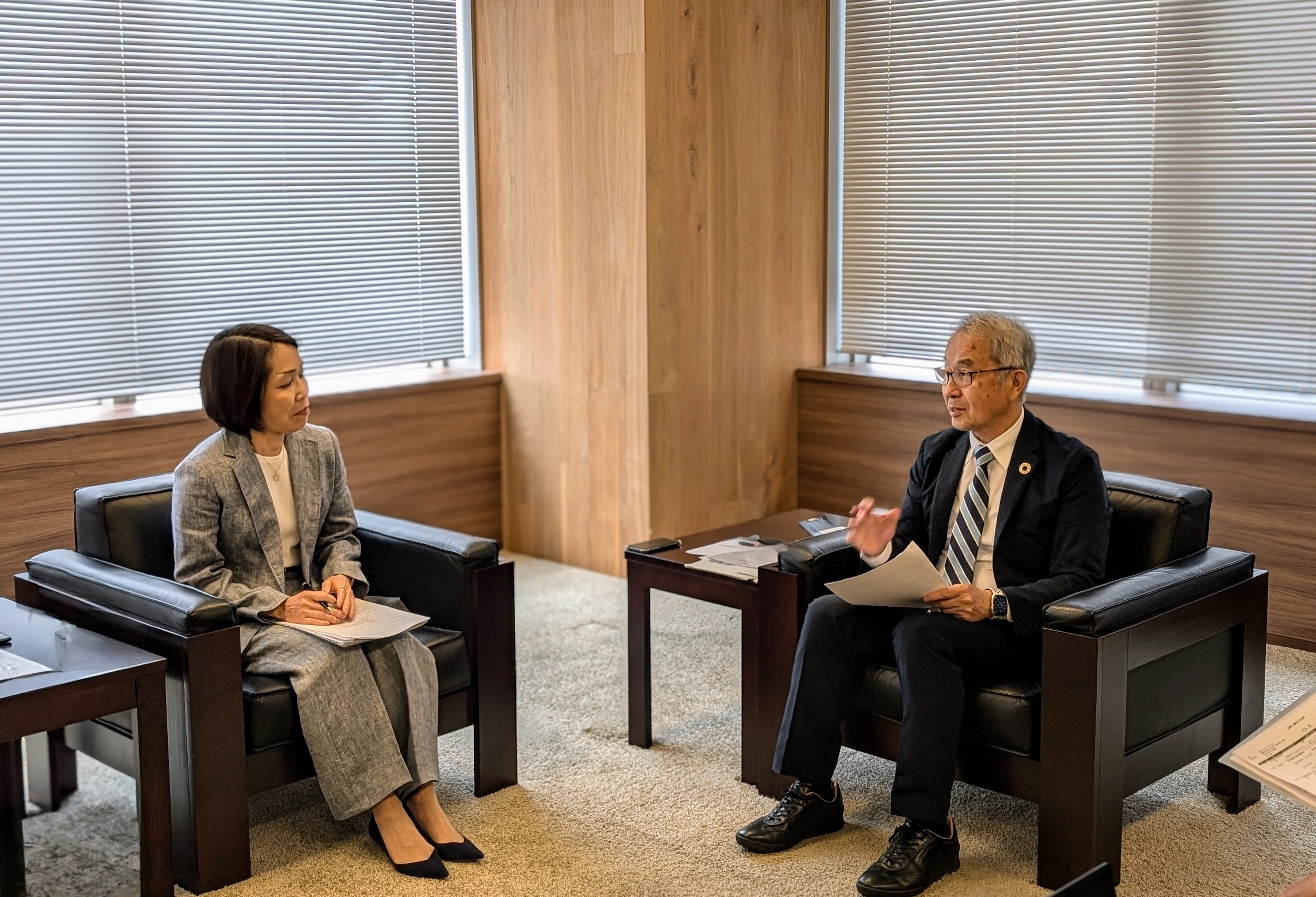
――Being a global citizen first
Takeda: We have implemented the first and second phases of our human rights due diligence plan. In the upcoming third phase, we will expand the scope to include our suppliers. It is crucial that we continue focusing on human rights issues as a corporate responsibility, but also that each person also takes responsibility .
Wakabayashi: It is essential that the results of your efforts are shared with suppliers, too, so they can see the Cosmo Group’s commitment to human rights. To achieve this, you must first ensure that personnel within the Group are properly upholding human rights, and that this commitment is effectively conveyed to suppliers. This is why continual efforts are critical. Since each person’s role as a member of society is more fundamental than their role as a member of a company or organization, everyone needs to help ensure that the rights of all human beings are protected. We do not receive much education on global citizenship in Japan, so the Cosmo Group should foster this outlook as part of its training activities. When senior management emphasizes global citizenship, employees become more aware of the concept. That is why I believe it is important for you as a senior executive officer to regularly talk about what it means to be a member of a global society.
Takeda: The idea of being a citizen first and a member of a company second is indeed very important. We need to act with sensitivity as individual human beings. As the director responsible for human resources, I feel the same way about promoting the advancement of women. Rather than giving special treatment to women, I believe in promoting fair and equitable opportunities for everyone, regardless of gender, and creating programs and workplaces where no one faces barriers.
――Human rights risks in the Middle East
Takeda: You undoubtedly remember how human rights issues were in the public eye during the 2022 FIFA World Cup in Qatar. As part of the human rights due diligence we conducted earlier on, I received reports on human rights issues in the Middle East. Oil-related operations in the Middle East lies at the core of our business. Although our affiliated companies in the region do not utilize the local kafala labor sponsorship system, we are having internal discussions on specific measures we can take, when necessary, to address labor rights issues there. Since we must interact with Middle Eastern governments as part of our operations in the region, I would appreciate your insights on how to best approach situations stemming from the policies of these nations.
Wakabayashi: Since the Middle East is a high-risk region for human rights, with issues ranging from freedom of expression to the rights of migrants, companies can expect to face challenges there. The question is how each company intends to address such issues. Therefore, it is crucial to analyze risks and take appropriate actions when necessary, and to share information about what you are doing. The first question that arises is whether a company has quietly condoned a questionable practice by not taking action, despite having influence. This should be included in any risk analysis of human rights due diligence. At THINK Lobby, we also create self-checklists that companies can use. Designed to help make society more just, our materials indicate the actions expected of companies along with examples of good practices.
Takeda: These are not issues that can be resolved overnight, but we must analyze the current challenges. Sometimes we need to start by improving our level of understanding, and at least gain an awareness of the situation.
――Climate change and human rights initiatives
Wakabayashi: In 2022, the United Nations recognized the human right to a clean, healthy and sustainable environment. Although the connection between the environment, climate change, and human rights has not been discussed enough in Japan, it is important to be able to say that you are addressing climate change, including the human rights aspects. The UN Guiding Principles on Business and Human Rights incorporate international law and other global rules. In the same way, climate change is an issue that should be addressed under a common framework. Companies must recognize that environmental and climate change issues are also human rights issues. They must also carry out environmental and human rights due diligence in an integrated way, and ensure accountability in addressing climate change.
Takeda: Given the greater frequency of natural disasters and rapid environmental changes worldwide, the Cosmo Energy Group considers climate change to be one of its top challenges. While it is not realistic for any one company to come up with a quick climate fix, it is important to keep an eye on the latest information and trends on a daily basis in order to steadily address climate change issues. I believe that both senior management and frontline personnel need to continually examine their roles in light of these issues, and to quickly adapt to social and environmental changes.
Wakabayashi: Since many challenges still remain, it is impossible to tackle everything at once. Therefore, I hope the Cosmo Energy Group will continue to make steady progress based on our conversation today, and strive to become a leading company in the area of human rights protection.
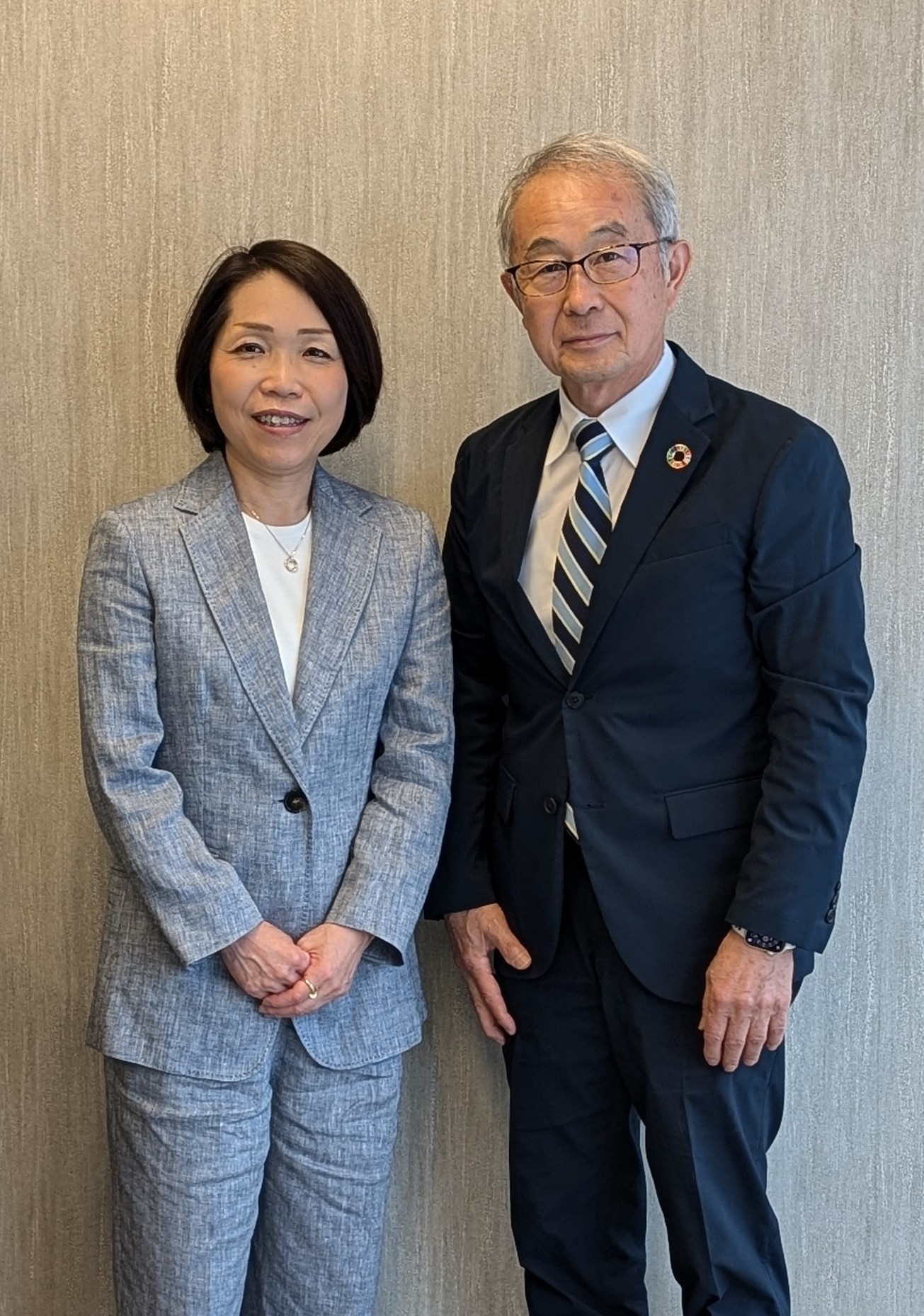
(Right) Hideki Wakabayashi, Director, THINK Lobby, Japan NGO Center for International Cooperation (JANIC)
(Left) Junko Takeda, Director and Senior Executive Officer, Cosmo Energy Holdings Co., Ltd.
We invited Hideki Matsuoka, Special Project Manager at the Asia-Pacific Human Rights Information Center (Hurights Osaka) to exchange views on our human rights initiatives with Takaki Kodama, General Manager of our Sustainability Initiative Department.
Kodama: In December 2021, we established our Human Rights Policy, which states our commitment to protecting human rights not only within the Group but also throughout the supply chain. Between August and November 2022, we conducted the first phase of human rights due diligence on the value chain of petroleum products, our main business. We intend to expand the scope to the entire Group in the future. We would be interested in receiving your recommendations on our human rights initiatives.
Matsuoka: From what you have told me, I have the impression that you have made a lot of progress on your initiatives since two years ago. However, I am worried about the discrepancies between the key human rights issues described in the Human Rights Policy and the list of potential issues identified via due diligence. In addition, harassment, violation of women’s rights and gender issues, for example, are serious problems that can happen any time. However, it is important not to be complacent about “remediation” just because risk hedging mechanisms are in place. In other words, “remediation” is used in the UNGPs to mean the remediation of adverse impacts, so care must be taken to avoid confusion within the company. The UNGPs also require careful treatment of the connotations of “risk” when incorporating it into risk management systems. The situation has changed dramatically in the last ten years, and interest in business and human rights concerns has increased considerably in the past few years especially. I would to see a focus on what you are doing as a company first. Governments have also started to take various initiatives, but it is companies that are ultimately responsible for their own business activities.
Kodama: Your comments helped me to understand the next issues we need to address. Thank you very much for giving us your valuable feedback today.
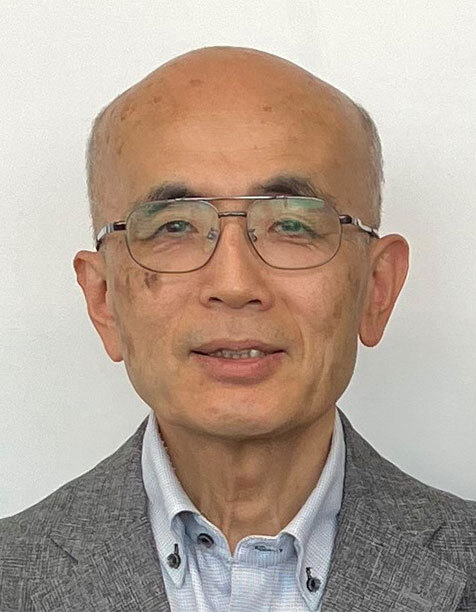 Hideki Matsuoka,
Hideki Matsuoka,
Special Project Manager,
Asia-Pacific Human Rights Information Center
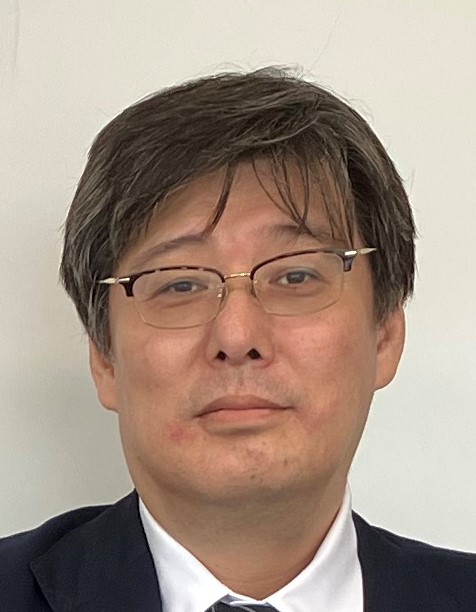 Takaki Kodama,
Takaki Kodama,
General Manager,
Sustainability Initiative Department
Participating in External Human Rights-Related Organizations
The Cosmo Energy Group participates in the Industrial Federation for Human Rights, Tokyo and is working hard to address human rights issues.
The Industrial Federation for Human Rights, Tokyo is a voluntary body with 120 corporate members, most of which are headquartered in Tokyo. Approximately 1.5 million people, including those from group companies of corporate members, have participated in the federation’s activities (as of July 2025). The aim is to firmly establish the respect for human rights that companies must have from a corporate perspective, including by promoting exchange of information among member companies, in-house training and awareness initiatives, raising awareness of human rights, and establishing rewarding workplaces.
Initiatives to Improve the Work Environment
The Cosmo Energy Group implements initiatives to improve the work environment, including ensuring respect for basic human rights and prohibition of discrimination. We also conduct an employee awareness survey every year to ascertain the actual situation in each workplace.
The Cosmo Energy Group pays employee wages above minimum wage standards, exceeding such standards and complying with relevant laws and regulations, both in and outside Japan.
We also strive to improve the workplace environment, enhance welfare benefits, and increase wages paid as social circumstances evolve.
Cosmo Mutual Aid Association
The Cosmo Mutual Aid Association provides benefit, loan, and other programs necessary to achieve its objectives, seeking to improve the welfare of its members and their families, including employees and officers of Cosmo Oil and its main affiliated companies.
In addition to various benefit programs such as maternity/childcare leave benefits and nursing care leave benefits, the association provides various loan programs for daily life, such as educational funds and disaster recovery funds.